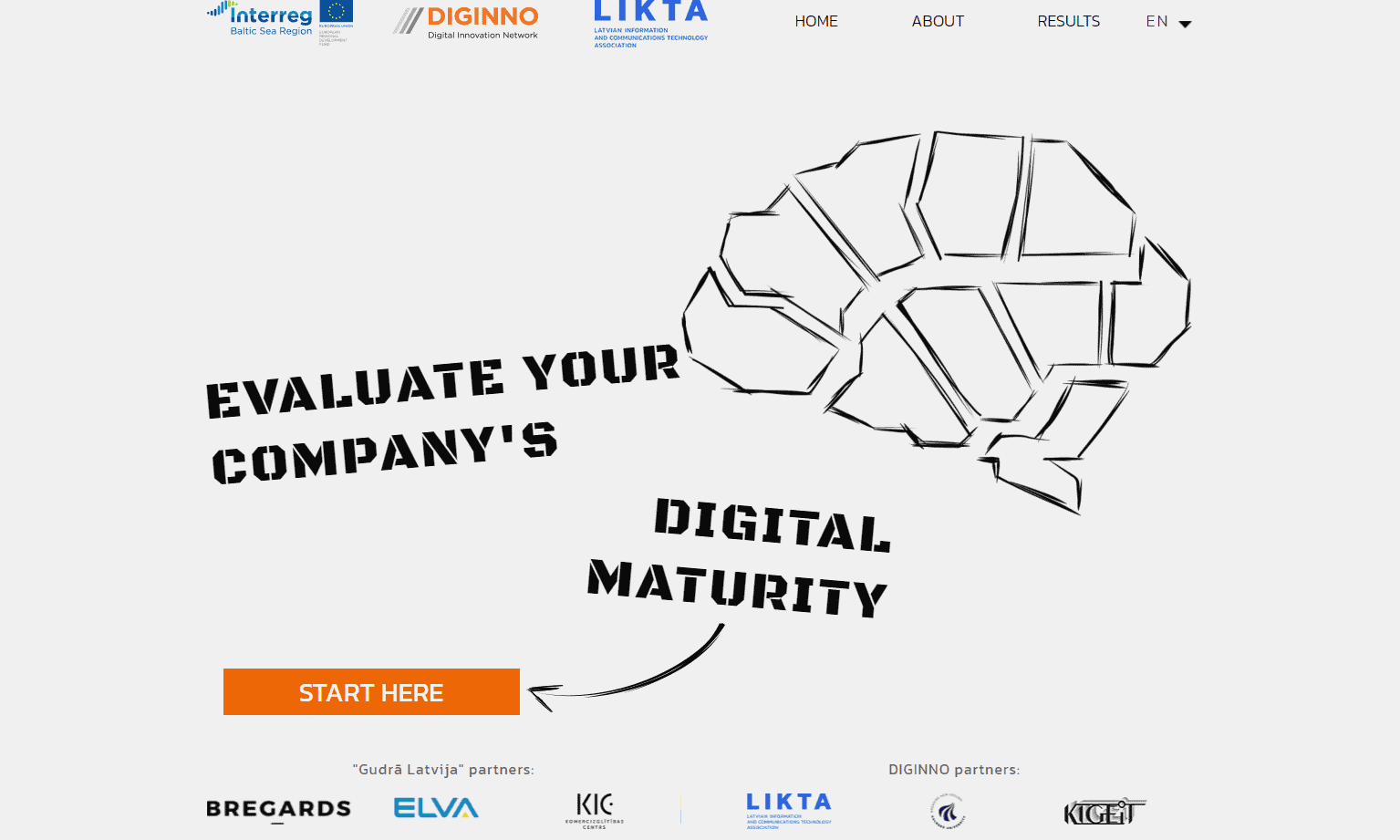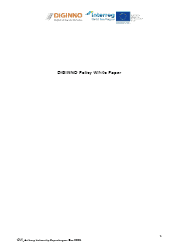DIGINNO
As the digital economy and a digital single market are seen as drivers of innovation, competitiveness and growth, there is a need to accelerate the integration of ICT solutions. Even if the countries across the Baltic Sea region are frontrunners in many aspects of digital economy, more needs to be done in terms of enhancing and balancing digital economy development in the region.
To address the challenge, the project DIGINNO focused on facilitating digital single market related to policy discussions. The aim was to develop a strong cross-sectoral industry digitalisation community and engage associations, universities, public authorities and sectors to better understand each-others challenges and find common solutions. The project hads chosen a government-to-business approach and focused on how governments and their policy approach can support more digitalisation.
The project aimed to increase the capacity of policymakers, industry associations and industrial small and medium-sized enterprises (SMEs) to enable faster and more efficient uptake of digital solutions both in public and private sectors. The point of departure was that the challenges can be tackled through strengthening the macro-regional knowledge base, exchange of experience and peer-to-peer learning, designing and piloting transnational digital solutions and conducting policy and regulatory dialogue.
Budgets
in numbers
-
3.50MillionTotal
-
2.75MillionErdf
-
0.00MillionEni + Russia
-
0.05MillionNorway
Achievements
Mapping the status on digitalisation potential in the region
The project DIGINNO focused on common challenges in the Baltic Sea region in the context of digitalisation, such as uptake of ICT in the business sector, the innovation of public services and cooperation of digital policies on the macro-regional level. The partners analysed digital potential and mapped sector activities for industry digitalisation. The project partners from 10 countries and additional external stakeholders established an informal digital policy network. The project addressed policy aspects as an integrated part of developing concrete tools, e.g. how policies may turn into challenges for the target groups but also enable new solutions across borders. The analysis covered the need for concrete policy solutions to enable well-functioning digital transformation for SMEs and smooth cross-border transactions. Such support included for example further development regarding data interchange, know-your-customer-approach and e-receipts.
Aligning digital approaches
The toolkit starts from digitalisation examples. It refers to challenges, country-specific information and a self-assessment tool to evaluate the level of digitalisation and to support identifying gaps. Beyond developing tools, the cooperation in working groups, seminars or other means of exchange has contributed to an increased institutional capacity of partners and external stakeholders on industry and government levels. A more harmonised digital policy mindset and increased awareness of the potential of aligning digital approaches across the Baltic Sea region have grown. The collaboration process itself has shaped the network as a source for developing ideas and engaging partners for future joint initiatives
Outputs
Digitalisation toolkits

Cross-border e-services
Overview of policy-related ideas and recommendations

Project Stories
-
24.11.2021
Moving towards a single digital market in the Baltic Sea region
The uptake of digital solutions both in the public and private sectors is the key to boost innovation and remain competitive. The Interreg project DIGINNO helped small and medium sized enterprises (SMEs), industry associations and policy makers speed up the Baltic Sea region’s transition to a single digital market.Read full story
Partners
Ministry of Economic Affairs and Communications of Estonia
- TownTallinn
- RegionPõhja-Eesti
- CountryEstonia
- RepresentativeJanek Rozov
- Phone
- E-Mail
- Web
Estonian Association of Information Technology and Telecommunications
- TownTallinn
- RegionPõhja-Eesti
- CountryEstonia
- RepresentativeDoris Põld
- Phone
- E-Mail
- Web
Foundation Tallinn Science Park Tehnopol
- TownTallinn
- RegionPõhja-Eesti
- CountryEstonia
- RepresentativeAnu Puusaag
- Phone
- E-Mail
- Web
DIMECC Ltd.
- TownTampere
- RegionPirkanmaa
- CountryFinland
- RepresentativeReijo Tuokko
- Phone
- E-Mail
- Web
Polish Chamber of Commerce of Electronics and Telecommunications
- TownWarszawa
- RegionMiasto Warszawa
- CountryPoland
- RepresentativeKrzysztof Chełpiński
- Phone
- E-Mail
- Web
Latvian Information and Communications Technology Association
- TownRiga
- RegionRīga
- CountryLatvia
- RepresentativeAndris Melnudris
- Phone
- E-Mail
- Web
Ministry of Environmental Protection and Regional Development
- TownRiga
- RegionRīga
- CountryLatvia
- RepresentativeGatis Ozols
- Phone
- E-Mail
- Web
Engineering Industries Association of Lithuania LINPRA
- TownVilnius
- RegionVilniaus apskritis
- CountryLithuania
- RepresentativeDanuta Murygina
- Phone
- E-Mail
- Web
Association INFOBALT
- TownVilnius
- RegionVilniaus apskritis
- CountryLithuania
- RepresentativeRūta Šatrovaite
- Phone
- E-Mail
- Web
RISE AB
- TownKISTA
- RegionGävleborgs län
- CountrySweden
- RepresentativeTorbjörn Jonsson
- Phone
- E-Mail
- Web
Aalborg University
- TownAalborg Øst
- RegionByen København
- CountryDenmark
- RepresentativeKnud Erik Skouby
- Phone
- E-Mail
- Web
WITHDRAWAL (31/10/2018):The Ministry of Transport and Communications of the Republic of Lithuania
- TownVilnius
- RegionVilniaus apskritis
- CountryLithuania
- RepresentativeKristina Semėnė
- Phone
- E-Mail
- Web
The Brønnøysund Register Centre
- TownBrønnøysund
- RegionNordland
- CountryNorway
- RepresentativeHåkon Olderbakk
- Phone
- E-Mail
- Web
Ministry of the Economy and Innovation of Republic of Lithuania (partner as of 1.04.2018)
- TownVilnius
- RegionVilniaus apskritis
- CountryLithuania
- RepresentativeArūnas Cijūnaitis
- Phone
- E-Mail
- Web
-
Project managerGrigori OšomkovMinistry of Economic Affairs and Communications of Estonia
-
Legal representativeAndo LeppimanMinistry of Economic Affairs and Communications of Estonia
-
Financial managerReet ReismaaMinistry of Economic Affairs and Communications of Estonia
-
Communication managerHeidi MüllaOÜ Sorpresa



